Building Interdisciplinarity
How the analysis of underlying structures and core questions of disciplines can open up ways for a non-hierarchical, modular and combinatorial approach to cooperative research.
Preprint
In: Working Papers Series der Interdisziplinären Forschungsstelle Wissenschaft – Demokratie – Verfahrensgestaltung. Berlin 2024
Abstract
Interdisciplinarity is seen as research’s answer to complex problems and as a recipe against the parcelling of science. The importance of interdisciplinarity is reflected in a growing number of interdisciplinary research agendas, handbooks and introductions to interdisciplinary studies. But the question of how interdisciplinary research can actually be realised widely evokes perplexity. Here we present an approach that conceptualises interdisciplinary research in a new way. By assuming not disciplines but different types of research as basic elements of interdisciplinary cooperation, a programme of type-based modular combinatorial interdisciplinarity can be developed. Such a form of interdisciplinary research does not aim at integration on a common basis, but at a complementarity of differences. In the combinatoriality of different research modules lies the opportunity for a much more conscious research planning. The recognition of different forms of research can help to make research programmes more circumspect and sustainable.
The present text is an independent, completely revised presentation of considerations that were previously developed in a German-language book publication (Werner Kogge: Einführung in die Wissenschaften, Wissenschaftstypen, Deutungskämpfe, Interdisziplinäre Kooperation, Bielefeld, Transcript 2022). Some of the graphics have been adopted, the captions translated.
